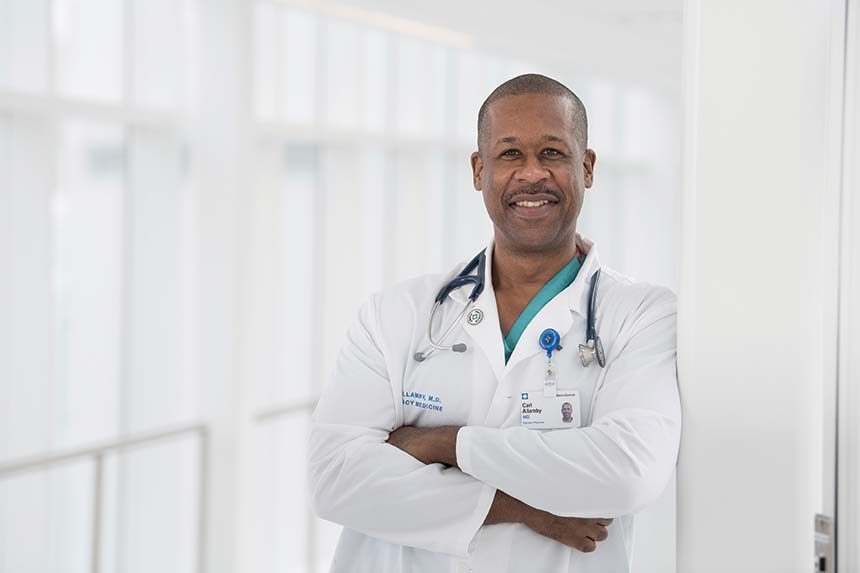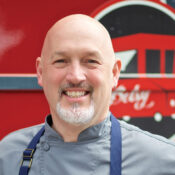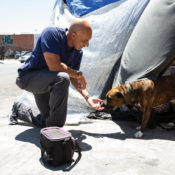Carl Allamby, M.D., was on the phone with a cardiologist at Cleveland Clinic Akron General hospital when he overheard a nurse complaining about her car. Once he finished the call, Allamby approached her.
“Why didn’t you come to me?” he asked.
Before beginning his residency in emergency medicine at age 47, Allamby was an auto mechanic and owned multiple repair shops. The transition from leaky carburetors to clogged arteries was dramatic and unexpected. In his mid-30s, while pursuing a business degree in night school at Ohio’s Ursuline College, he was required to take biology. He delayed taking the course until his last semester — “I couldn’t see what biology had to do with business,” he says — but when his enthusiastic instructor began discussing anatomy, it awakened a long-dormant interest in medicine. Within an hour, Allamby knew that he would switch professions and pursue a career in healthcare.
The human body is more complex than a Honda Civic, but the transition from motors to medicine wasn’t as jarring as it may seem. Both jobs involve diagnostic skills. Both involve identifying and solving problems. And Allamby’s years as a business owner give him relationship and customer service abilities far beyond those of his colleagues.
“He has a better customer service skill set than most physicians ever have in their careers,” says Steven Brooks, M.D.,chief of staff at Cleveland Clinic Akron General. “He can develop a rapport with patients instantly. He knows how to walk into a room and build confidence by making eye-to-eye contact and just doing calming, reassuring things.”
“He has a better customer service skill set than most physicians ever have in their careers.”
As a child, Allamby always wanted to be a doctor. But growing up in the impoverished city of East Cleveland, Ohio, a medical career seemed like a fantasy. The city experienced a major economic downtown in the 1960s and ’70s, and Allamby’s father, a minister turned door-to-door salesman, struggled to feed his six children. “There was a lot of crime, a lot of despair, a lot of broken homes,” Allamby recalls.
The local high school focused heavily on vocational classes to help students immediately join the work force, rather than steer intelligent students like Allamby toward white-collar careers. “Nobody around me talked about being a doctor,” Allamby says. “Nobody I knew had any connections to doctors. It was a dream that slowly faded away.”
Allamby had strong mechanical skills and enjoyed taking things apart. In high school, he got a job at a local car parts store. Soon he was doing repairs and maintenance on the side, working at night in a parking lot and saving enough money to buy some tools. Then the owner of an auto shop saw him working in the cold. He had extra space and told Allamby that for $400 a month, he could set up shop in his building.
“He saw a young guy who was working hard, working in the cold, and he gave me a chance,” says Allamby. “I was 19 and that was the beginning of my automotive repair business. And the shop just grew and grew and grew.”
After Allamby took his fateful biology class, he started volunteering at a local hospital, working in a pediatric ward for immune-compromised children, followed by stints in other departments and other hospitals. Giving up a successful career while raising a family may have seemed risky — and exhausting — but friends and relatives were supportive, particularly his wife, who’s a physical therapist. “She was really excited about it,” he says. “She knew all of the challenges that I faced being a small businessman, and when things were tough, she always encouraged me to keep going.”
Allamby earned a Bachelor of Science degree from Cleveland State University in 2015, then enrolled at Northeast Ohio Medical University that same year. He had continued to run his business while taking pre-med classes, but sold it once he entered med school. The transition from experienced 25-year businessman to 43-year-old med school student was difficult.
“I went from having a high level of expertise to being a neophyte,” he says. “So you’re at the top, and then you start all over, and you’re picturing all of the work, all the hours, all of the struggles that it’s gonna take to get back to that level. And I’m still not there yet.”
The volume of work in med school was also a challenge. “It’s unlike anything I’ve experienced,” he says. “I went through undergrad and got straight As. I went through pre-med and got straight As. But when you go to medical school, I don’t care how smart you are, you’re going to struggle, because of the volume and the complexity of the material. You get a mediocre grade and people pat you on the back and say, ‘Good job.’ You almost feel like a failure because you’re not used to struggling so much just to make it through.”
Allamby graduated in 2019 at age 47 and began his residency at Cleveland Clinic Akron General. Given his age and radical career shift, his story attracted the attention of the Cleveland Plain Dealer, which led to appearances on NPR, the CBS Evening News, and The Kelly Clarkson Show. Allamby is an in-demand motivational speaker, and he even signed a contract with talent agency William Morris, which is pitching a TV show based on his life.
But Allamby is first and foremost a doctor — and a damn good one. He routinely scores in the top of his class in annual in-service exams and serves as a calming and inspiring mentor for his younger peers in the E.R., says Brooks.
“To be an emergency-room physician, you’ve got to like the challenge of chaos,” Brooks says. “You never know what’s coming through the door, and you’ve got to quickly adapt. He has that skill set.”
Patients routinely compliment Allamby for his empathy, concern, and professionalism. “I’ve had a lot of patients who have written me thank you letters, and one even called the ombudsman, who said she never hears good news from patients,” he says with a laugh. “My mom and my dad always taught me to be there for people and to treat people fairly. People want to feel like they’re listened to and that their problems are being addressed.”
The COVID-19 pandemic has been stressful, Allamby says, but it has highlighted his compassion for his patients. While working in the ICU (as a resident, he does rotations outside the emergency department), one man was on a ventilator, dying alone. His family was in Florida and couldn’t return, but his daughter told Allamby that he wanted Psalm 23 read as he died.
“In the final moments of his life, he asked me if I would take his Bible,” says Allamby. “We called for the chaplain, but the chaplains had been busy because there was so much going on. So I grabbed the Bible and sat by his side and held his hand as I read the verses.” The patient died a few hours later.
Allamby will finish his residency in 2022. When he gives talks, he speaks frequently of the obstacles facing students in underserved communities. But he also hopes his story will inspire others who, like him, have the brains and drive to succeed. That includes his four children. Allamby’s son is an EMT, one daughter is in nursing school, and another wants to become a doctor, just like dad.
“I’ve realized that my story gives a lot of people hope,” he says. “I don’t care who you are or where you’re from: You can have an impact on other people’s lives.”
And yes, Allamby still provides engine advice. Remember the nurse with the car problem? Allamby looked under the hood and spotted the issue: A rusted flex pipe in the exhaust system.
“She was thinking about getting rid of the car, but it’s like a $100 repair,” says Allamby.
It’s the story of his life. Dr. Allamby will fix your problems. The valves are just a little different now.
Ken Budd is the author of The Voluntourist. His work appears in the 2020 edition of The Best American Travel Writing.
This article is featured in the November/December 2021 issue of The Saturday Evening Post. Subscribe to the magazine for more art, inspiring stories, fiction, humor, and features from our archives.
Featured image: Shifting gears: Growing up poor, Carl Allamby’s youthful dream of becoming a physician seemed like a long shot: “Nobody around me talked about being a doctor.” (The Cleveland Clinic)
Become a Saturday Evening Post member and enjoy unlimited access. Subscribe now



